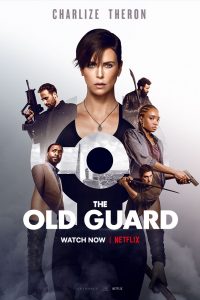Rebels Without a Clue: A Review of The Hunger Games: Mockingjay – Part 2
 by Gary Westfahl
by Gary Westfahl
As I review The Hunger Games: Mockingjay – Part 2, one major challenge will be to avoid repeating what I said while reviewing The Hunger Games: Mockingjay – Part 1 (2014) (review here) – because, as their titles indicate, they are two parts of the same film, planned simultaneously and largely filmed at the same time. (There is absolutely no pretense that this is a separate film, inasmuch as the film begins with Katniss removing a collar, the filmmakers being confident that audiences will recall the attempted strangulation that ended The Hunger Games: Mockingjay – Part 1 and immediately understand the scene without any need for explanations.) There are also obvious resonances between these films and their precursors, The Hunger Games (2012) (review here) and The Hunger Games: Catching Fire (2013) (review here), creating more opportunities for irksome redundancy. So, in The Hunger Games: Mockingjay – Part 2, one can definitely detect echoes of the points I have already extracted from the previous films – that young people today regard themselves as victims of adult mistreatment, yet they also want adults to solve all their problems, simply because young people are inherently and amazingly wonderful – but I will shift my attention to other, more novel, messages in this generally entertaining but occasionally disappointing film.
Psychologists might note, first of all, that within these films’ mixture of persecution complexes and narcissism, there are issues of youthful self-esteem to address as well. When I was growing up, juvenile fiction tended to focus on youngsters who were smarter than their parents – like the Hardy Boys, who solved mysteries that had baffled their father, master detective Fenton Hardy. In sharp contrast, Katniss Everdeen (Jennifer Lawrence) is constantly manipulated and outwitted by the adults around her, though they periodically pause to obligingly explain what is going on. Even her one shocking action at the end of the story, that appeared to represent her own carefully considered decision, is recast here as the direct result of the intricate machinations of former Gamemaker turned rebel Plutarch Heavensbee (Philip Seymour Hoffman) – though the point is muted because the late Hoffman was not available to film the final scenes where he would revel in his triumphs, and awkward efforts to convey his lingering presence were less than successful. Thus, although the film’s ostensible theme is the need for Panem’s citizens to achieve freedom from tyranny, it is ultimately suggested that, despite the apparent establishment of a democracy, the cunning Plutarch will remain secretly in control of the nation, and young people like Katniss will prove too dense to figure that out unless some adult reveals the truth.
Contributing to the sense that Katniss is one taco short of a combination plate is that, as previously noted in passing, novels can easily convey what characters are thinking, so that Collins’s novel Mockingjay (2010) does provide Katniss with moments of insightful reflection; but films find it more difficult to convey thoughts, and this particular film isn’t even trying, creating a film heroine who seems less intelligent than her written counterpart. In the novel, for example, while Gale and Peeta are discussing their rivalry for Katniss’s affections, she overhears Gale saying, “Katniss will pick whoever she thinks she can’t survive without.” She reacts in this fashion:
A chill runs through me. Am I really that cold and calculating? …. There’s not the least indication that love, or desire, or even compatibility will sway me. I’ll just conduct an unfeeling assessment of what my potential mates can offer me …. It’s a horrible thing for Gale to say, for Peeta not to refute. Especially when every emotion I have has been taken and exploited by the Capitol or the rebels. At the moment, the choice would be simple. I can survive just fine without either of them.
Here is a Katniss who is smart and feisty, who understands the full implications of Gale’s statement as well as all of the ways that adults have been pulling the strings in her life, and a Katniss who is nonetheless determined to control her own destiny. In the film, however, Gale (Liam Helmsworth) says his line and Katniss doesn’t react at all, continuing to project her characteristic aura of numb, uncomprehending passivity as she and the other characters get up and carry on with the action.
It is telling that, early in the film, when someone asks Katniss “What’s going on in your head?” she replies “I don’t know”; later, evil President Alma Coin (Julianne Moore) says that “she’s mythic.” Indeed, audiences rarely know that Katniss is thinking, and she sometimes seems less than a real person and more of an icon, who is periodically prodded or provoked to do something that communicates her virtuous character. Perhaps all of this can be attributed to adult mistreatment; at one point, Peeta (Josh Hutcherson) comments to Joanna (Jena Malone) that the Capitol officials who tortured them “messed us up pretty good,” but even though they didn’t have the same experience, Katniss and the film’s other young heroes might similarly complain that the adults in their lives have messed them up. And so, like dogs that have been repeatedly beaten, young people become emotionless and listless, even as the adults continue to push them around.
Further, the film subtly undermines an audience’s perception of Katniss’s intelligence and assertiveness in the way it presents the romantic triangle at the heart of Collins’s original trilogy. The novel Mockingjay makes it very clear that Katniss will ultimately reject Gale because he is not a nice person, as conveyed by her reaction to his observation above and the description of their final conversation. In contrast, she will embrace Peeta because he is a nice person, and the novel emphasizes that by having him volunteer to bake a wedding cake for Finnick and Annie; and, when he plants primroses near Katniss’s home, Katniss realizes that he is doing so in memory of Katniss’s sister Prim. Yet the film obscures Gale’s coldness, consistently presenting him as a stalwart companion to a woman who is remaining distant from him for no good reason. And Peeta’s warmth is underplayed because the film omits the wedding cake and any explanation for the primroses, and makes him more unsympathetic by having him say something to Katniss, during their first meeting after his brainwashing, that is far crueler than anything he said in the novel. Perhaps, despite the ending imposed upon them by the novel, the filmmakers were naturally inclined to favor the traditionally manly Gale over the haplessly wimpy Peeta, but as a result, the film suggests in the end that Katniss ultimately settled on Peeta mainly because he showed up – which is precisely how a numb, passive woman would choose a husband.
But dwelling on the film as a commentary on young people and their relationships with old people, even in a somewhat different manner, might start to seem, well, irksomely redundant, so let us turn to the ways that the film addresses social divisions based not on age but on gender, race, and class.
Schooled by decades of feminism, filmmakers have absorbed the lesson that women are often good, and men are often bad. So it is that the admirable rebels include several prominent women in their ranks, including Katniss, President Coin, Commander Paylor (Patina Miller), former Hunger Games winner Enobaria (Meta Golding), and Lieutenant Jackson (Michelle Forbes). In contrast, the evil Capitol is controlled by the male President Snow (Donald Sutherland), and while he is constantly accompanied by a female aide, Egeria (Sarita Choudhury), the powerful members of his inner circle all appear to be men; and a female face or two might lurk behind the masks of the oppressive Peacekeepers, but every single one of them certainly looks like a man. And, of course, all of the mindless zombies that attack Katniss and her cohorts are clearly gendered as male. (All right, they are officially termed “mutts,” or mutated creatures devised by sinister Capitol scientists, but whereas the novel described them as “a mix of human and lizard,” the filmmakers unimaginatively made them look more or less exactly like the hideous, homicidal, rapidly-moving zombies that we have previously observed in scores of films, including I Am Legend [2007] [review here] and Maze Runner: The Scorch Trials [2015] [review here].)
Celebrating diversity, the makers of the Hunger Games films were also careful to give important heroic roles to African-American actors, to emphasize the virtuousness of their race, even when the novels said nothing about the characters’ racial background. So, the rebel forces include major African-American players: Enobaria, the brilliant inventor Beetee (Jeffrey Wright), Katniss’s commander Boggs (Mahershala Ali), and Paylor, who eventually becomes Panem’s new president. But when Snow leads a roundtable meeting of his principal subordinates, they all appear to be Caucasian; and of course, Snow’s favorite color is white.
All of this is well and good; yet truly celebrating diversity means assembling a cast that is truly, well, diverse, and the Hunger Games films fall far short of that goal. So, yes, it’s great to see all of those African-Americans, but except for scattered faces in the crowds, one observes no Hispanics, Asian-Americans, Native Americans, or Arab-Americans. As it happens, Choudhury is of Indian descent, and the minor character of Homes is played by Arab-American actor Omid Abtahi, but you have to consult the Internet Movie Database to find this out; based on the way they are presented in the film, one might take them for Caucasians with a tan. It is as if filmmakers are scared to death of what Al Sharpton might say about their movies, but couldn’t care less about the reactions of civil rights leaders and organizations representing other minorities.
Further, genuine diversity involves differences other than racial differences. I suppose one could say that having the injured Beetee continue assisting the rebels while confined to a wheelchair is a gesture towards disabled Americans, but it is also noteworthy that the disabled Beetee in the final two films receives far less screen time than the ambulatory Beetee in the second film. And in the year when the United States finally accepted gay marriage, it is disheartening to watch film after film wherein there is never the slightest indication that any characters might be romantically interested in someone of the same gender. In the Hunger Games films, only the flamboyant costumes of the Capitol residents, which might be regarded as stereotypically gay, even hint that a few homosexuals might exist in this future society. And this seems a pointless and hurtful omission. This film has one touching moment when, in the midst of some stunned refugees silently marching toward promised shelter, we observe a man embracing and kissing his female companion. Why not show a man embracing and kissing a male companion? Are filmmakers really afraid that such a scene might provoke fierce indignation and audience boycotts? If so, it is a sad commentary on an industry that has always included more than its share of gay and lesbian employees.
Finally, a complete commitment to diversity means that one can cast a member of any race in any sort of role, yet filmmakers seem stubbornly committed to the notion that African-Americans in major films are only allowed to be good. No one imposes this requirement on women, so we regularly observe prominent villainesses like this film’s President Coin, Patricia Clarkson’s Ava Paige of Maze Runner: The Scorch Trials, and Meryl Streep’s Chief Elder in The Giver (2014) (review here). But while I’m sure there are other examples, the only prominent African-American villain I could recall was Yaphet Kotto in Live and Let Die, way back in 1973. And this is shame in the case of the Hunger Games films because, determined to cast an aging Caucasian actor as the evil Snow, the filmmakers settled for Donald Sutherland, who has never been a particularly good actor, and his performance as Snow is consistently inadequate, a grating mixture of unpersuasive nastiness and inappropriate giddiness. It would have been a brilliant coup to obtain the services of an infinitely better actor, Morgan Freeman, and he might have taken the role in order to have the rare opportunity, for once in his career, to defy audience expectations and do some really despicable things. Instead, Freeman has largely been limited to playing one larger-than-life saint after another, which has provided him with a certain power as an actor but surely must get monotonous at times.
The film, more so than the novel, also emphasizes that the rebellion against the Capitol involves the virtuous lower class properly opposing the effete, decadent upper class. In a speech that does not occur in the novel, Snow attempts to rally the Capitol residents to his side by casting the conflict as a class struggle: the rebels “do not share our values” and are attacking us because they resent “our comfort and sophistication.” In a comment not found in the novel, Gale theorizes that the people of the Capitol are gullible because of the fancy foods they eat, presumably in contrast to the cheap, hearty foods that the rebels eat to keep themselves sharp and savvy. At Finnick and Annie’s wedding, guests celebrate by doing some square dancing to the accompaniment of a fiddle, and you can’t get more plebeian than that; in Snow’s mansion, we observe a stately grand piano. In the novel, Katniss and Peeta undertake to write a book, filled with images and written memories of departed friends; in the film, this detail is omitted, and the only books we see are those on the shelves of Snow’s office. Railing against the educated elite might seem like a sure-fire crowd-pleaser, but it might be recalled that Disney’s Beauty and the Beast (1991) portrayed its heroine as an obsessed bookworm without diminishing her popularity in any way, and it’s hard to see how this film’s appeal would have been compromised by showing Katniss reading, or writing, a book, or having her appropriate a few of Snow’s fine sculptures to decorate her humble home.
So, to summarize in full this film’s message: generally speaking, if you are young, female, African-American, and/or poor and uneducated, you are Good; generally speaking, if you are old, male, Caucasian, and/or rich and sophisticated, you are Evil. Well, I can’t say that I’m rich, but I exhibit every other quality on the Evil Checklist, so I suppose I should hang my head in shame and acknowledge that I am unworthy to evaluate a wonderful film that so heartily embraces and validates everything that I am not. Yet in criticizing me, Hollywood is also criticizing itself – something that it does with paradoxical energy and enthusiasm. Film executives are often homosexuals, so they exclude homosexuality; film executives are greedy, so they condemn greed (as in Jurassic World [2015] [review here); film executives are mostly old white men, so they frequently demonize old white men; film executives are wealthy, so they depict wealth as a corrupting influence; film executives are intelligent and worldly, so they valorize common sense and naiveté. No doubt they are doing these things primarily because they believe it is the most profitable path, but one might also speculate that, in their own way, film executives also have some problems with their sense of self-esteem.









This is the most ridiculous review I’ve ever read in my life. Claims of homophobia and a lack of emotional coinciding with the novel counterparts are completely unfounded. The author seems upset that the “24” novels written by himself, as described in his pretentious bio, haven’t garnered 1/30 of the attention this considerably significant trilogy has. The author attempts to manipulate this installment of the trilogy into a quest for political correctness. The author notes that there is seemingly a lack of Arab-Americans and the like in this film. With all due respect, who cares? This is the most trivial argument I’ve ever read, and I’m a person of color. The author clearly has too much time on his hands. This is sad.
“And in the year when the United States finally accepted gay marriage, it is disheartening to watch film after film wherein there is never the slightest indication that any characters might be romantically interested in someone of the same gender.”
Castor and Pollux, members of the film team and Squad 451, seemed to me clearly meant to be a couple.
Sometimes a film is just a film. Your column, however, is worthy of something I would write in graduate school where you are taught to overprocess the slimist detail and then present it as a sphere shaking revelation.